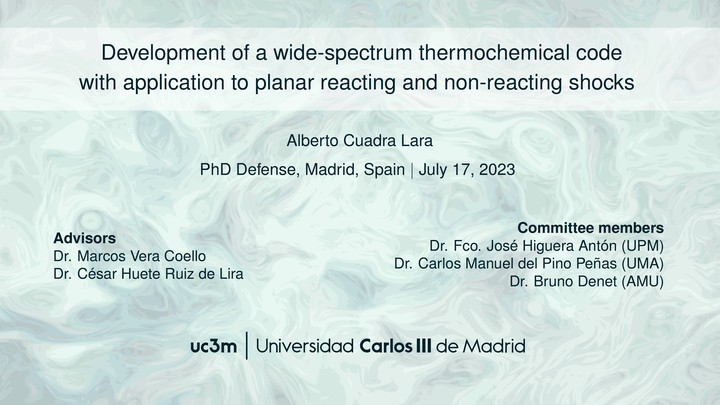Development of a wide-spectrum thermochemical code with application to planar reacting and non-reacting shocks

Abstract
The recent scientific and technological advancements have underscored the critical necessity for reliable, robust, and efficient numerical codes capable of predicting the chemical composition and properties of complex mixtures at chemical equilibrium. In response to this demand, this thesis presents the development and validation of a novel open-source thermochemical code called Combustion Toolbox (CT). This tool is designed to determine the equilibrium state of multi-species mixtures in gaseous or pure condensed phases, including ions. The code incorporates a comprehensive suite of algorithms, ranging from fundamental chemical equilibrium problems to complex computations of steady shock and detonation waves in various flow configurations, as well as predictions of rocket engine performance. Implemented in MATLAB, CT is accompanied by a user-friendly graphical user interface, ensuring flexibility and accessibility for all users. Extensive validation demonstrates excellent agreement with established codes such as NASA’s CEA, Cantera within Caltech’s Shock and Detonation Toolbox, and the recent Thermochemical Equilibrium Abundances code. CT has been utilized in all of the studies presented in this thesis, demonstrating its reliability and versatility. The second part of the thesis delves into the theoretical analysis of reactive and non-reactive shocks propagating through non-homogeneous conditions. Conducting experiments and high-fidelity simulations in this field can be challenging and computationally expensive. In this context, linear interaction analysis has emerged as a valuable tool to evaluate the hydrodynamical aspects contributing to the amplification of disturbances across the shock. Two prominent cases are investigated. Firstly, the study focuses on detonations with inhomogeneities in the upstream fuel mass fraction. The findings reveal that, in most cases, the detonation propagation speed is higher than in equivalent homogeneous scenarios. Subsequently, the investigation shifts towards the interaction of hypersonic shocks with turbulent flows, incorporating the associated thermochemical effects in single-species diatomic gases. The analysis is further extended to multi-species mixtures using CT, with a particular emphasis on air. These studies demonstrate that thermochemical effects arising at hypersonic velocities significantly enhance turbulent fluctuations in the post-shock gas compared to the simplified thermochemical frozen gas assumption.